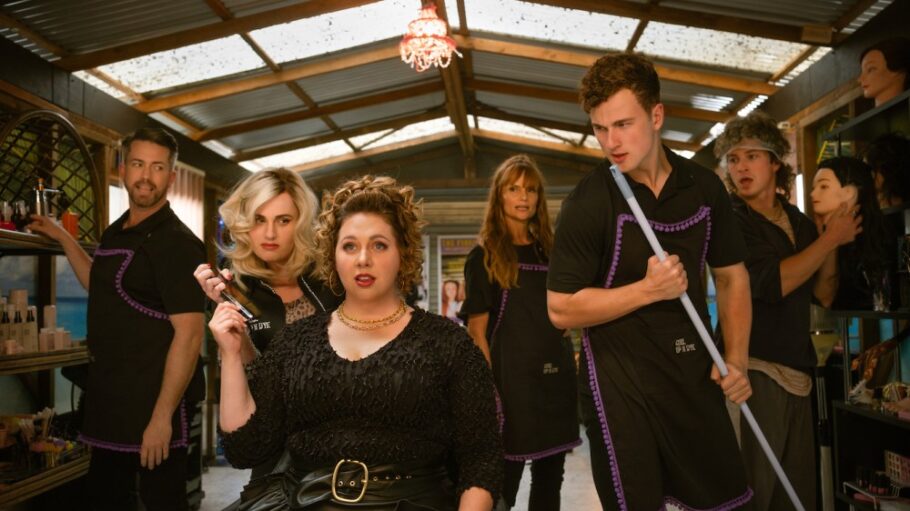According to tradition, debutante balls are designed to introduce young ladies to polite society. But in Australian comedy star Rebel Wilson’s rowdy directorial debut, “The Deb,” there isn’t really anything that resembles “polite society.” Wilson’s characters run the gamut from uncouth to in-your-face offensive — none more than the tacky small-town beautician Wilson embodies in a brash, John Waters-esque musical satire, situated where overzealous progressive values meet old-school pageantry at its most patriarchal.
It’s unfortunate that the film’s Toronto Film Festival closing-night premiere is overshadowed by legal disputes between Wilson and three of her producers, since “The Deb” delivers where it counts. The project pokes fun at all parties while rewriting the codes of teenage romance for the 21st century. Right out of the gate, it’s “Hairspray” meets “High School Musical,” as the elaborately choreographed, radio-inappropriate opening number, “FML,” sets the tone for all that follows (rhyming words, like “economy” and “problematic,” that you don’t typically hear on Broadway).
Set deep in the outback, where well-meaning folks remain decades behind the times, “The Deb” presents an up-to-the-minute riff on Aesop’s classic “town mouse and country mouse” fable. After her latest school protest gets her expelled, big-city cousin — and indignant “cancel pig” — Maeve Barker (Charlotte Macinnes) is packed off to dusty, dead-end Dunburn.
There, Maeve is expected to fit in with rural relative/social outcast Taylah Simpkins (Natalie Abbott), who’s routinely bullied by the popular girls: Annabelle (Stevie Jean), Danielle (Brianna Bishop) and Chantelle (Karis Oka), who call themselves the “Pixie Cups.” Snappily dressed and TikTok-ready at all times, Maeve seems to have far more in common with the social media-obsessed trio than she does with her less image-conscious cousin. To her credit, however, Maeve instinctively takes Taylah’s side when her classmates try to humiliate her.
The Dunburn Debutante Ball is just a few weeks away, and Taylah — who anticipates her big night the way girls raised on Disney fairy tales do the day their prince will come — can’t find a date to save her life. To complicate matters, Maeve almost instantly attracts the attention of Dusty (Costa D’Angelo), whose floppy-haired, “Rebel Without a Cause” look suggests Dunburn isn’t so cut off from culture to not have heard of Timothée Chalamet.
Earlier, Maeve had mused, “I think I might be the feminist voice of my generation,” rejecting any attempt at chivalry with a curt, “What is it about my birth sex and/or gender performance that makes you assume?” The ball works on a girls-ask-guys basis, and once Dusty accepts her (accidental but not unwelcome) invitation, the only thing Maeve still finds “problematic” is identifying someone to escort Taylah. That and trying to hold a united front against the Pixie Cups.
Those three vixens see the event as a chance to launch their influencer careers; they’re pressured to succeed by Annabelle’s ambitious stage mom, Janette (Wilson), who operates a salon called Curl Up N Dye out of her garage. With her outrageous fashion (boots, feather boas and denim skirt sets) and killer song (“It’s time to get ugly”), Wilson risks hijacking her own movie. Then again, she’s consistently the funniest thing on-screen: a bad-taste terrorist determined to take down Maeve.
Love Film & TV?
Get your daily dose of everything happening in music, film and TV in Australia and abroad.
To American audiences, who know Wilson from scene-stealing roles in “Bridesmaids” and “Pitch Perfect,” “The Deb” might feel engineered to be Wilson’s splashy coming-out party: a chance for the multi-threat to present her gifts, both comedic and creative, in a whole new light. Australians, on the other hand, should already be familiar with this side of Wilson, whose career took off down under in 2008 with the six-episode musical sitcom “Bogan Pride.”
Screenplay credit goes to Hannah Reilly, who wrote the stage musical from which “The Deb” was adapted with Meg Washington. While their lyrics are clever and contemporary, this project is every bit Wilson’s jam. Her sensibility is grounded in sincerity but relies on bawdy, off-color jokes to deflect from empowerment messaging that might otherwise seem square. And it works: You tend not to feel preached to when Wilson is bragging about giving her signature “back, crack and sack wax” to Hugh Jackman (or brandishing the hairy swath to prove it).
Janette is the polar opposite of Taylah’s down-to-earth father (Shane Jacobson), a widowed farmer (and well-meaning mayor) trying to raise funds to save their drought-stricken community. He doesn’t understand the weight Taylah puts on the event, but values the advice of a shrewish seamstress (“Strictly Ballroom” star Tara Morice), who missed her ball back in high school, and designs ridiculously elaborate gowns for the younger generation.
Audiences haven’t seen much of Wilson since her 2020 weight loss. That physical transformation makes her seem even fiercer here, though it’s refreshing to see her continuing to embrace all body types in the casting of this ensemble, especially in her choice of Abbott (who played the lead in a touring production of “Muriel’s Wedding the Musical”). As Taylah, Abbott recalls Ricki Lake in “Hairspray”: Both remain irrepressibly upbeat, even when their peers try to shame them.
Taylah seems so guileless that it’s hard to follow an unconvincing plot turn that occurs about two-thirds of the way through, when Janette succeeds in driving a wedge between the cousins. But the movie has at least half a dozen characters in need of enlightening. The trick is to change their minds, while allowing everyone to remain true to themselves — to have a ball and deflate it too.
From Variety US































